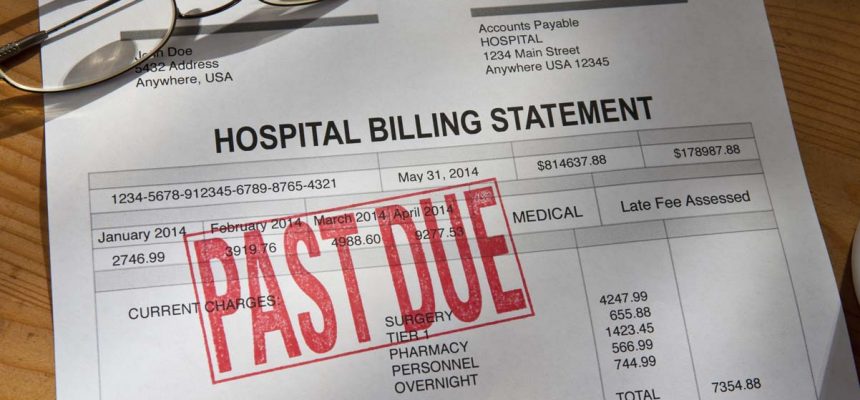TN Hospital Scrutinized For Lawsuits, Wage Garnishing
By Consumers For Quality Care, on July 8, 2019

When Carrie Barrett arrived at the emergency room at Memphis’ Methodist University Hospital in 2007, she had a shortness of breath, tightness in her chest, swelling in her leg, and her toes were turning black. Barrett had a family history of high blood pressure and had been recently diagnosed with congestive heart failure. Doctors performed a heart catheterization. The trip to the ER resulted in a two-night stay and a $12,000 bill, according to ProPublica.
Barrett says she does not remember ever receiving notices from the hospital regarding her outstanding bill. But in 2010, Methodist sued Barrett, who has never made more than $12 per hour, for the charges plus attorney and court fees. In nearly a decade, the hospital system has increased the interest to the debt seven times and garnished her wages 15 times. She now owes roughly $33,000, an amount twice what she made last year.
Between 2014 and 2018, Methodist Le Bonheur Healthcare has filed more than 8,300 lawsuits, ProPublica found. Older cases remain on courts dockets as well. Methodist, like Mary Washington Hospital in Virginia, has found itself under public scrutiny for its handling of unpaid patient bills.
Its handling of poor patients begins with a financial assistance policy that, unlike many of its peers around the country, all but ignores patients with any form of health insurance, no matter their out-of-pocket costs. If they are unable to afford their bills, patients then face what experts say is rare: A licensed collection agency owned by the hospital.
ProPublica found that Methodist has sued dozens of its own employees for unpaid bills.
Methodist said that debts are only sent to collections and the courts as a “very last resort.” However, other hospital systems affiliated with the United Methodist Church in Dallas and Houston do not sue or garnish wages at all.
Methodist Hospital’s website says that it is “committed to a culture of compassion,” but on the morning of Barrett’s appearance in Shelby County General Sessions Court all 80 of the lawsuits on the Division 5 docket had been filed by Methodist.
Barrett had submitted a sworn affidavit of income and property, which spelled out her dependents, bank account balances, debts, assets and monthly expenses. Barrett wrote that her checking account had $20 in it. Her monthly income was $750 per month, and her expenses were about twice that.
The amount that Barrett’s debt had increased over the years even caught the eye of Judge Betty Thomas Moore, who presided over her case. When Barrett could, she had tried to chip away at the debt, but it was no match for the incurring interest.
Methodist has been hounding Barrett for nearly a decade as she has moved from one low-income job to another. Sometimes the wage garnishes were denied because Barrett’s pay was not high enough but Methodist continued adding interest to her original debt. The hospital system added interest to Barrett’s bill seven times, in amounts ranging from $46 to $7,340.
Charging that much interest to a low-income patient is “unconscionable,” said Fred Morton, a retired minister of Christ United Methodist Church in East Memphis … “That kind of indebtedness. … That’s horrible to me.”
If defendants, like Barrett, had lawyers in court they might be able to negotiate down some of the costs and fees. Most do not have counsel, however, and try to navigate the system on their own. In a single day, only one defendant out of 80 Methodist cases had legal representation.
“I was telling my daughter, and she was saying, ‘You need to talk to somebody,’” Barrett recalled. She thought about going to a free legal clinic offered by Memphis Area Legal Services, she said, “but when you’re the only sole support in your household, you can’t just take off days.”
Standing in front of Judge Moore without representation, Barret asked that she be allowed to make $40 a month payments towards her debt. Moore denied the request, telling Barrett instead that she must pay $100. Barrett knows she can’t afford it.
If she’d had a chance, she would have told the judge she was perpetually late on her utility bill and sometimes, she’s had to let her car insurance lapse because she can’t afford it. “She don’t take but a few seconds to make that sentence. It was just moving them in and moving them out. They don’t have no kind of empathy for people.”
Barrett has been doing her best to make the monthly payments, paying less to other bills and relying on payday loans. This month, she missed her first payment since her latest hearing. Even if Methodist does not add any more interest, at the rate she pays with the debt she has, she won’t be done paying until she is 90.
Since the release of ProPublica’s report, Methodist Le Bonheur Healthcare has announced that it is suspending its “court collection activities” over consumers’ unpaid bills. The hospital said that it will review its practices during the suspension. It has also dropped more than two dozen previously outstanding cases.



